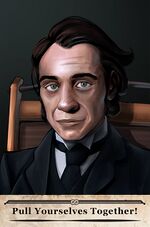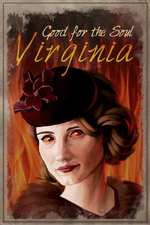Lord Mayor of London: Difference between revisions
KestrelGirl (talk | contribs) mNo edit summary Tag: visualeditor |
KestrelGirl (talk | contribs) No edit summary Tag: visualeditor |
||
| (2 intermediate revisions by the same user not shown) | |||
| Line 1: | Line 1: | ||
{{Event | |||
|title1=Mayoral Elections | |||
|image1=ballotbox.png | |||
|date=1894-1898 | |||
|location=[[London]] | |||
|notable_figures=[[Sinning Jenny]]<br> | |||
[[Feducci]]<br> | |||
[[The Jovial Contrarian]]<br> | |||
[[Virginia]]<br> | |||
[[The Viscountess of the Viric Jungle]] | |||
}}<blockquote>''"Three candidates compete for the Mayorship. Who has your vote? Who will be best for London? Or for you?"''<ref>{{Citation|https://fallenlondon.wiki/wiki/Choose_a_Candidate|Choose a Candidate|Fallen London|}}</ref> </blockquote>For a brief period of time, [[London]] had a Mayor (or later a Lord Mayor), as the [[Masters of the Bazaar]] entertained the concept of having a third authority figure in the city alongside themselves and the [[Empress]]. Beginning in 1894, three well-known Londoners competed each summer to win a year-long term by popular vote, each bringing unique agendas and promises. In 1898, the office was abolished by the Masters, as the actions of the final Lord Mayor led to a chain of events that nearly destroyed the city. | |||
==1894== | ==1894== | ||
| Line 10: | Line 20: | ||
<blockquote>''"Once again, London shall choose a mayor, to reign for a year and attempt to put as much of their policy into practice as time and decency allows. The people must decide!"''<ref>{{Citation|https://fallenlondon.wiki/wiki/The_Mayoral_Election_1895|The Mayoral Election 1895|Fallen London|}}</ref></blockquote>[[File:Election_Feducci.png|thumb|Feducci's Campaign Poster|225x225px]][[Feducci]], the [[Dauntless Temperance Campaigner]], and the [[Implacable Detective]] campaigned for Mayor in 1895. Despite the [[The Tomb-Colonies|tomb-colonist]] Feducci's controversial dealings with [[Hell]]<ref>[https://fallenlondon.wiki/wiki/Feducci%27s_Campaign_1 Choose a Target: Feducci's Campaign] ''"Feducci's campaign manager [is] a very Indulgent Devil […] "Feducci has helped us in the past […] When we felled all thrones, he was in the vanguard. I think he rather misses such grand sport.""''</ref> and challenges in translating his principles into actionable policy,<ref>[https://fallenlondon.wiki/wiki/Feducci%27s_Campaign_1 Feducci's Campaign 1, ''Fallen London''] ''"Feducci's dusty offices are a chaos […]: All Could Rise, Most Shan't. Equality in Death, Liberty in License.' […] notes in various other handwriting suggests many hours spent […] trying to put these principles into policy, with little success."''</ref> he won with nearly half the vote.<ref>{{Citation|https://fallenlondon.wiki/wiki/1895:_The_Victor_is_Announced!|1895: The Victor is Announced!|Fallen London|}} ''""Darling voters," Jenny begins, flashing a smile as bright as her rosary, "You have elected my successor. I shan't keep you in suspense. I wish him all the luck in the world." Feducci steps forward, offering the crowd a regal wave. Thundering roars of approval hail his victory, met equally by explosive jeers. Feducci stands above them all, laughing."''</ref><ref>{{Citation|https://www.failbettergames.com/news/election-1895-a-winner-announced|Election 1895: A Winner Announced!|Failbetter Games|}} ''"Feducci claims victory with nearly half the vote!"''</ref> He promised a more egalitarian and meritocratic London, where any citizen could reach their full potential.<ref>[https://fallenlondon.wiki/wiki/Feducci%27s_Campaign Feducci's Campaign, ''Fallen London''] ''"The master of the Black Ribbon duelling society has amassed a formidable following. His jet and crimson banners herald his arrival […]. "Fair Play, Fair Game" is his slogan, and is the tenet by which one rises and falls within his ranks."''</ref> | <blockquote>''"Once again, London shall choose a mayor, to reign for a year and attempt to put as much of their policy into practice as time and decency allows. The people must decide!"''<ref>{{Citation|https://fallenlondon.wiki/wiki/The_Mayoral_Election_1895|The Mayoral Election 1895|Fallen London|}}</ref></blockquote>[[File:Election_Feducci.png|thumb|Feducci's Campaign Poster|225x225px]][[Feducci]], the [[Dauntless Temperance Campaigner]], and the [[Implacable Detective]] campaigned for Mayor in 1895. Despite the [[The Tomb-Colonies|tomb-colonist]] Feducci's controversial dealings with [[Hell]]<ref>[https://fallenlondon.wiki/wiki/Feducci%27s_Campaign_1 Choose a Target: Feducci's Campaign] ''"Feducci's campaign manager [is] a very Indulgent Devil […] "Feducci has helped us in the past […] When we felled all thrones, he was in the vanguard. I think he rather misses such grand sport.""''</ref> and challenges in translating his principles into actionable policy,<ref>[https://fallenlondon.wiki/wiki/Feducci%27s_Campaign_1 Feducci's Campaign 1, ''Fallen London''] ''"Feducci's dusty offices are a chaos […]: All Could Rise, Most Shan't. Equality in Death, Liberty in License.' […] notes in various other handwriting suggests many hours spent […] trying to put these principles into policy, with little success."''</ref> he won with nearly half the vote.<ref>{{Citation|https://fallenlondon.wiki/wiki/1895:_The_Victor_is_Announced!|1895: The Victor is Announced!|Fallen London|}} ''""Darling voters," Jenny begins, flashing a smile as bright as her rosary, "You have elected my successor. I shan't keep you in suspense. I wish him all the luck in the world." Feducci steps forward, offering the crowd a regal wave. Thundering roars of approval hail his victory, met equally by explosive jeers. Feducci stands above them all, laughing."''</ref><ref>{{Citation|https://www.failbettergames.com/news/election-1895-a-winner-announced|Election 1895: A Winner Announced!|Failbetter Games|}} ''"Feducci claims victory with nearly half the vote!"''</ref> He promised a more egalitarian and meritocratic London, where any citizen could reach their full potential.<ref>[https://fallenlondon.wiki/wiki/Feducci%27s_Campaign Feducci's Campaign, ''Fallen London''] ''"The master of the Black Ribbon duelling society has amassed a formidable following. His jet and crimson banners herald his arrival […]. "Fair Play, Fair Game" is his slogan, and is the tenet by which one rises and falls within his ranks."''</ref> | ||
Upon taking office, Feducci transformed the mayoral mansion from Jenny's artists' commune<ref name=":0" /> into a hub of gambling and dueling.<ref>[https://fallenlondon.wiki/wiki/The_Mayor_of_London_%28Feducci%29? The Mayor of London (Feducci), ''Fallen London''] ''"Feducci has thoroughly […] redesigned Blythenhale. […] Gambling tables are liberally spread […]. The floorboards are demarcated with chalk, setting the boundaries for duellists. Eager Londoners gather to wager their goods and lives. You've been invited."''</ref> His administration was characterized by turmoil and corruption;<ref>[https://fallenlondon.wiki/wiki/Trade_Feducci%27s_Favour_for_a_Commemorative_Certificate Trade Feducci's Favour for a Commemorative Certificate, ''Fallen London''] ''"He pulls out a readily prepared certificate […] Then, with a flourish, he scrawls something. He hands the certificate over: "I presume you'll hang this prominently." His titles have no more force than nicknames. Maybe this is for the best […]"''</ref> he faced constant protests | Upon taking office, Feducci transformed the mayoral mansion from Jenny's artists' commune<ref name=":0" /> into a hub of gambling and dueling.<ref>[https://fallenlondon.wiki/wiki/The_Mayor_of_London_%28Feducci%29? The Mayor of London (Feducci), ''Fallen London''] ''"Feducci has thoroughly […] redesigned Blythenhale. […] Gambling tables are liberally spread […]. The floorboards are demarcated with chalk, setting the boundaries for duellists. Eager Londoners gather to wager their goods and lives. You've been invited."''</ref> His administration was characterized by turmoil and corruption;<ref>[https://fallenlondon.wiki/wiki/Trade_Feducci%27s_Favour_for_a_Commemorative_Certificate Trade Feducci's Favour for a Commemorative Certificate, ''Fallen London''] ''"He pulls out a readily prepared certificate […] Then, with a flourish, he scrawls something. He hands the certificate over: "I presume you'll hang this prominently." His titles have no more force than nicknames. Maybe this is for the best […]"''</ref> he faced constant protests, which he unsuccessfully attempted to dissuade via intimidation.<ref>[https://fallenlondon.wiki/wiki/Protest_against_the_Mayor_(Feducci) Protest against the Mayor (Feducci), ''Fallen London''] ''"The protesters stand outside the Mayoral Manor. A platoon of Feducci's supporters, armed with swords and rifles, face them: the Constables simply watch from the sidelines, there only to intervene in case of homicidal disagreement."''</ref> His illegal erasure of criminal records further eroded public trust,<ref>[https://fallenlondon.wiki/wiki/Trade_Feducci%27s_Favour_for_a_reduction_in_your_Criminal_Record Trade Feducci's Favour for a reduction in your Criminal Record, ''Fallen London''] ''""Easily done. Paperwork has a habit of getting lost when people are suitably motivated." He whispers to a servant, who dashes from the room."'' | ||
</ref> and he was ultimately unable to make substantive change during his term — although, despite his ambitious aims, it remains unclear whether he truly wanted to. | </ref> and he was ultimately unable to make substantive change during his term — although, despite his ambitious aims, it remains unclear whether he truly wanted to. | ||
Latest revision as of 11:15, 4 June 2025
"Three candidates compete for the Mayorship. Who has your vote? Who will be best for London? Or for you?"[1]
For a brief period of time, London had a Mayor (or later a Lord Mayor), as the Masters of the Bazaar entertained the concept of having a third authority figure in the city alongside themselves and the Empress. Beginning in 1894, three well-known Londoners competed each summer to win a year-long term by popular vote, each bringing unique agendas and promises. In 1898, the office was abolished by the Masters, as the actions of the final Lord Mayor led to a chain of events that nearly destroyed the city.
1894[edit]
"A hustings has been erected in Hastings Square. Banners festoon the lamplit streets. A Sable-liveried civil servant from the Ministry of Public Decency bellows an announcement.
'London is to have a Mayor. There will be an Election. The people shall decide.'"[2]

The three candidates in London's inaugural mayoral election were Sinning Jenny, the Bishop of Southwark, and the Jovial Contrarian. Jenny, who balances her duties as a warrior-nun and the owner of the infamous Parlor of Virtue, won decisively,[3][4] running on a platform of social reform and the fair treatment of workers.[5]
During her tenure, Sinning Jenny established her office in a previously disused mansion in Blythenhale, Spite;[6] the building was used as the official mayoral residence until its demolition by Feducci in 1896.[7] Jenny's primary accomplishment as Mayor was the establishment of a Finishing School in Ladybones Road, which aimed to educate and reform individuals with checkered pasts, granting them new opportunities and reintegrating them into society. The school was a clear success, and thrived under her guidance.[8]
1895[edit]
"Once again, London shall choose a mayor, to reign for a year and attempt to put as much of their policy into practice as time and decency allows. The people must decide!"[9]

Feducci, the Dauntless Temperance Campaigner, and the Implacable Detective campaigned for Mayor in 1895. Despite the tomb-colonist Feducci's controversial dealings with Hell[10] and challenges in translating his principles into actionable policy,[11] he won with nearly half the vote.[12][13] He promised a more egalitarian and meritocratic London, where any citizen could reach their full potential.[14]
Upon taking office, Feducci transformed the mayoral mansion from Jenny's artists' commune[6] into a hub of gambling and dueling.[15] His administration was characterized by turmoil and corruption;[16] he faced constant protests, which he unsuccessfully attempted to dissuade via intimidation.[17] His illegal erasure of criminal records further eroded public trust,[18] and he was ultimately unable to make substantive change during his term — although, despite his ambitious aims, it remains unclear whether he truly wanted to.
In a final act of defiance, Feducci destroyed the mayoral residence before his successor, the Jovial Contrarian, took office.[19]
1896[edit]
"The Election has come to London again. A successor to Mayor Feducci will be chosen. (Mayor Feducci's thoughts on the matter are unknown: he has refused to leave his residence Blythenhale.)"[20]

Mr Slowcake, the Jovial Contrarian, and the Captivating Princess campaigned for Mayor in 1896. The Contrarian was an unsuccessful candidate in 1894, but two years later, he campaigned with completely different views and promises (in truly contrarian fashion). Reacting both to his past failure and to Feducci's chaotic tenure, the Contrarian advocated for law and order and a return to civic discipline,[21] which ultimately won him the popular vote.[22][23] He was the only candidate to run for office more than once.
The Jovial Contrarian's platform was something of a facade; while his initiatives would theoretically strengthen some forms of authority in London, he actually aimed to divest as much authority as possible from the Masters of the Bazaar.[24] This was precisely what he sought out to do once elected,[25] by removing the extensive influence of the Ministry of Public Decency from the Constabulary.[26][27] Working out of his own townhouse due to Feducci's demolition of the mayoral mansion in Blythenhale,[28] he was a competent mayor and manager during his term, taking extra time to answer public concerns and keeping his staff content with reasonable hours.[29] He participated in diplomatic relations with Arbor when the city opened its gates later that year.[30] At the end of his term, he abolished the traditional Mayoral title, replacing it with "Lord Mayor" as a possible insult to his successor.[31]
1897[edit]
"It's election time again! A successor to the Jovial Contrarian must be chosen. The Contrarian himself is publishing lengthy diatribes both for and against each candidate, in contravention of electoral custom. It's important, he protests, that the electorate sees a range of views."[32]

Mrs Plenty, Virginia, and Madame Shoshana campaigned for Mayor in 1897. Virginia, a distinguished deviless with a profound interest in archaeology and the arcane, emphasized public health and personal betterment; she aimed to provide Londoners with avenues for both physical and spiritual rejuvenation.[33] She won the election, and thanks to the Jovial Contrarian's declaration of a change in terminology, became London's first Lord Mayor.[34][35]
Upon assuming office, Virginia acquired a fashionable townhouse on Ladybones Road, transforming it into London's inaugural public spa.[36] The facility offered a range of therapeutic services, blending the sensibilities of straight-laced human Londoners with infernal techniques,[37] but was ultimately a failure.[38] More significantly, Virginia's tenure was marked by a number of diplomatic initiatives, most notably her negotiations with Hell; these discussions culminated in the establishment of the Great Hellbound Railway, a monumental project that allowed for much larger-scale transit from London to Hell via the Hinterlands.[39]
1898[edit]
"It's election time again! A successor to Virginia must be chosen. When asked her opinion on the mayoral candidates, she smiles icily. Her only remark: 'Clearly, I have raised the aspirations of a broad range of Londoners. It is good to see a wider range of interests represented. This is only one sign of my many successes.' If she smiled harder she'd break a tooth."[40]

F. F. Gebrandt, the Viscountess of the Viric Jungle, and the Tentacled Entrepreneur campaigned for Mayor in 1898. Running on a platform of deep concern over the state of Parabola, and a promise to lead citizens into the realm of dreams to conquer their nightmares and grant themselves a good night's sleep,[41] the distinguished feline Viscountess won over 40% of the vote and became London's second and final Lord Mayor.[42][43]
The Viscountess, true to her word, focused on fortifying London's defenses against dream-based threats. She worked continuously to patrol Parabola and keep dreamers safe,[44] taking any opportunity to unearth new intelligence. However, rather than creating a straightforward solution to nightmares, the Viscountess' leadership entangled London in the Parabolan War.[45][46] To make matters worse, in her relentless pursuit of the Fingerkings, the Viscountess inadvertently disturbed the Stone Pigs while following her enemies into the pigs' dreams;[47] this precipitated the Grand Clearing-Out and nearly caused the destruction of London. Consequently, the Masters of the Bazaar abolished the Mayoral office.[48]
Historical & Cultural Inspirations[edit]
During the Victorian era, London did not have a directly elected mayoral position as it does today; this office, governing Greater London, was only established in 2000. However, there is also a Lord Mayor, who governs only the City of London as the leader of the City of London Corporation, and is elected by representatives from all the livery companies (guilds, professional associations) in the City. The latter office has existed since 1189, and its title was only changed to Lord Mayor in the first place after the implementation of the Mayorship of Greater London. Failbetter's depiction of the Jovial Contrarian changing the title of his own position may have been intended to poke fun at this change in nomenclature.
References[edit]
|